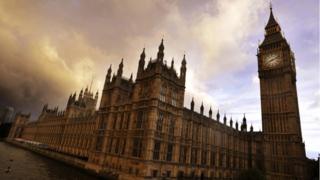 Image copyright
PA Media
Image copyright
PA Media
Rape allegations against an unnamed Conservative MP are being treated "very seriously", a senior official has said.
Chief Whip Mark Spencer said it was right the police were investigating.
The Tories have been criticised for not suspending the MP but Mr Spencer said anything that risked identifying the complainant must be avoided.
It is understood that Mr Spencer spoke with the complainant in April, but he insists that she did not make any allegation of serious sexual assault.
The MP, who is in his 50s, was arrested on Saturday and has since been bailed.
The Metropolitan Police said the allegations related to four separate incidents claimed to have taken place between July 2019 and January 2020.
The Sunday Times reported that the allegations against the former minister had been made by an ex-parliamentary employee.
What stops the media from naming rape suspects?
The police usually do not name suspects before charging them and there are two powerful parts of the law which deter the media from naming them.
Firstly, an alleged victim has automatic right under statute to lifelong anonymity. That right can only be waived in writing by the victim.
The media must therefore be careful not to add to a "jigsaw" identification and so must limit publishing any details which could help identify an alleged victim.
There are also strong privacy reasons for not naming. Cliff Richard's 2018 legal action against the BBC (and later cases) established that individuals under investigation by the state have a reasonable expectation of privacy in relation to the fact of an investigation and its details up until they are charged.
That can be displaced but only if there are sufficient public interest grounds to name the suspect. It is a balancing act which different parts of the media, advised by their different lawyers, view differently.
Which is why some parts of the media may decide to name more quickly than others.
A spokesman for the chief whip said that he took all accusations of harassment and abuse extremely seriously and had strongly encouraged anybody who has approached him to contact the appropriate authorities.
According to sources, Mr Spencer had not known the "magnitude" of the allegations.
But a report in the Daily Telegraph suggested the woman became frustrated after they spoke that nothing was done.
It is also understood the Leader of the House of Commons, Jacob Rees-Mogg, was told by an MP in recent weeks about the claims - with sources saying he had said the woman should contact the police.
'Very serious'
The decision not to remove the whip - which effectively expels members from the party - means he can continue to sit in the House of Commons as a Conservative.
The decision has been criticised by Labour's Jess Phillips, who said it was "shocking" and sent a "terrible message from Westminster".
Speaking to journalists as he left his home in Nottinghamshire, Mr Spencer said the allegations were "very serious" and it was up to the police to investigate them, not the whip's office.
"Once they've come to their conclusion, then we can assess where we're at and the position that the MP finds himself in," he said.

Media playback is unsupported on your device
Asked why the MP had not been suspended, he added: "Of course, we have got to bear in mind the victim, we don't want to do anything to identify the victim at the same time."
The Sunday Times, which first reported the story, said the complainant alleges that the MP assaulted her, forced her to have sex and left her so traumatised that she had to go to hospital.
The Metropolitan Police said it had launched an investigation into the allegations.
"On Friday, 31 July, the Metropolitan Police Service received allegations relating to four separate incidents involving allegations of sexual offences and assault," the force said in a statement.
"These offences are alleged to have occurred at addresses in Westminster, Lambeth and Hackney between July 2019 and January 2020."
Police said the man has been released on bail to return on a date in mid-August.
In 2016, the Commons approved changes to its procedures to end the practice of MPs being automatically identified by the Speaker if they had been arrested.
Under the rules in force since then, the MP involved will be consulted and named in Parliament only if there is an issue of "parliamentary privilege or constitutional significance" at stake.

 5 years ago
519
5 years ago
519 

